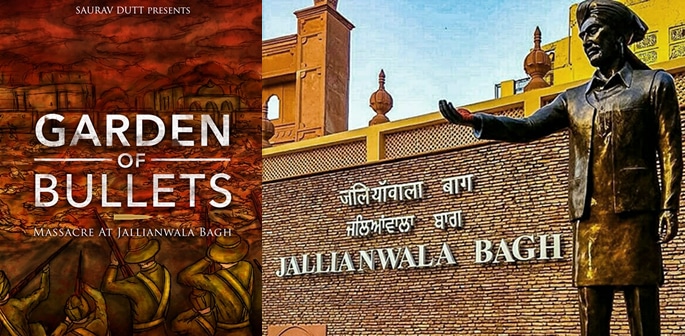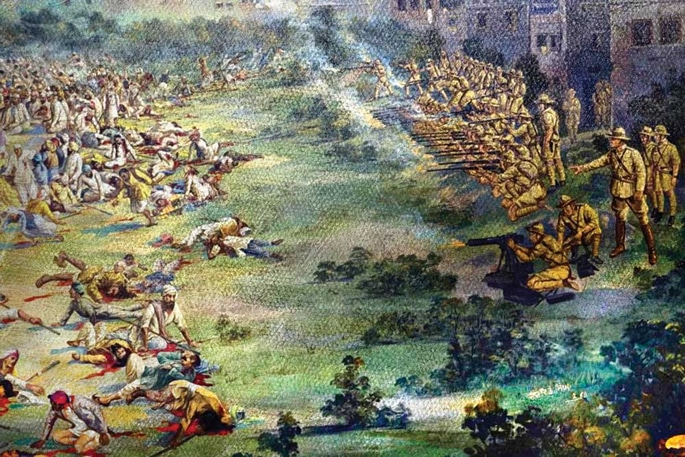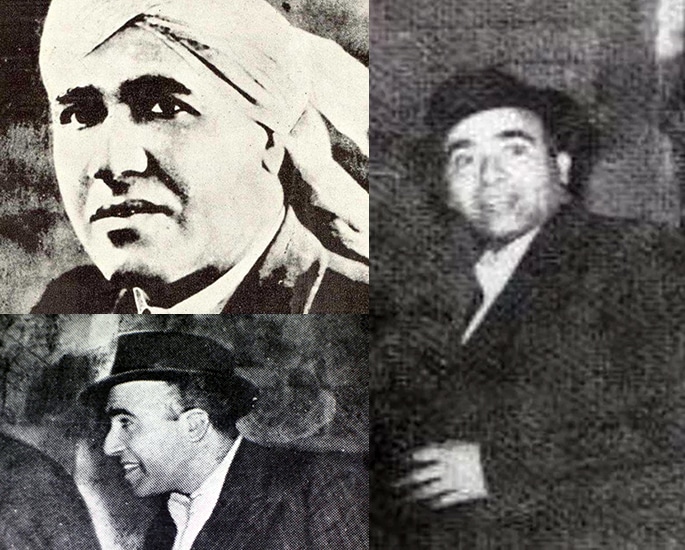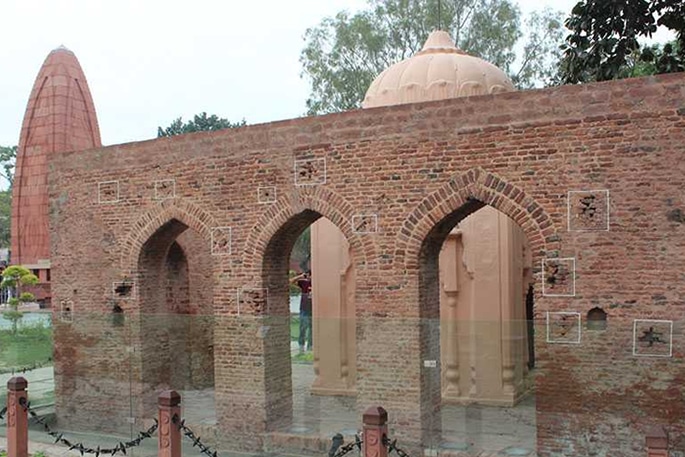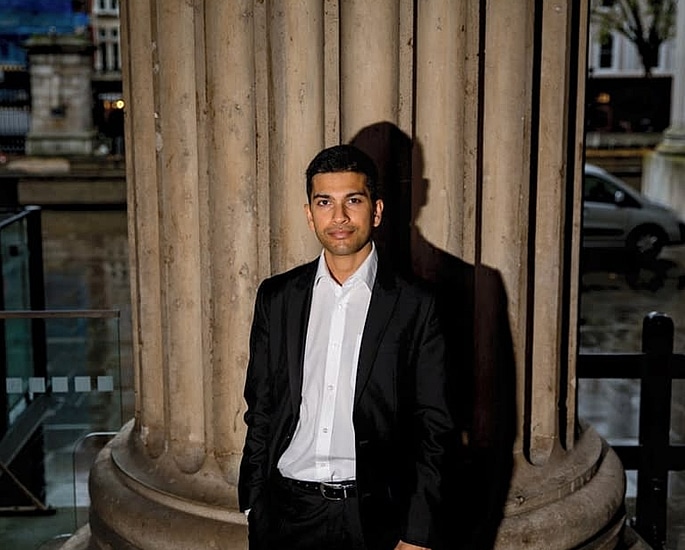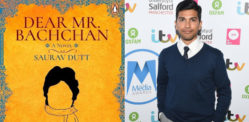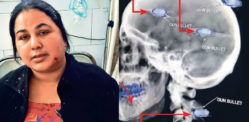"To me it is a deeply sad and horrific event of bloodletting"
The date of April 13, 2019, marks 100 years since the Jallianwala Bagh massacre, also known as the Amritsar massacre.
To commemorate the centenary of this horrific incident in Indian history, British Indian author Saurav Dutt has written a novel, Garden of Bullets: Massacre at Jallianwala Bagh, revisiting the unforgettable event.
The Amritsar massacre was a brutal incident which eventually brought about the end of the British empire.
The event caused many Indians to abandon their loyalty to the British and it signalled a beginning of Indian nationalism.
The historical book features a number of interviews from descendants of those who lived through the era of the massacre. Research from the Partition Museum, Amritsar has also been collated.
Saurav looks at the causes for unrest in Punjab before, during and after the Jallianwala Bagh massacre.
Dutt revisits the event in great detail in order to remind people of the tragic incident and to educate those who are not fully aware of what happened.
The book looks at the true brutality of the massacre and how it affected Indian independence.
Dutt explores the immediate aftermath with Udham Singh, an Indian activist, who assassinated Sir Michael O’Dwyer, the Governor of Punjab in 1919, in revenge for the atrocity.
In an exclusive interview with DESIblitz, Saurav Dutt talks about his reasons for writing the book and what the event means to him.
The Massacre
On April 13, 1919, Colonel Reginald Dyer implemented a curfew beginning at 8 pm that night. This was due to his belief that there would be a major insurrection.
There was also a ban on all public meetings of four or more people. The proclamation was explained in a number of languages but few paid attention to it.
On the same day, many people gathered in Jallianwala Bagh and most were there celebrating Vaisakhi. A special day for Sikhs but also the start of a new month.
When Dyer found out about the gathering, he went back to his base to decide on how to handle it.
Dyer sent an aeroplane to fly over the area and it was estimated that there were around 6,000 people present.
At 4:30 pm, Dyer went with Sikh, Gurkha, Baluchi and Rajput troops to the Bagh (garden). By that time, the crowd had increased to more than 10,000.
Dyer and the troops entered the garden, blocking the main entrance after them and took up position on a raised bank.
On Dyer’s orders, they fired at the crowd for 10 minutes, aiming towards the gates where people were trying to escape.
They fired until the ammunition supply was almost used up.
Approximately 1,650 rounds had been fired based on the number of empty cartridge cases picked up by the soldiers.
It has been debated on the number of casualties.
British Indian sources stated on a list that 376 people were killed, 102 were identified as Sikhs, 217 as Hindus and 57 as Muslims. In addition, around 1,100 wounded.
However, the Indian National Congress estimated that over 1,500 people were injured and around 1,000 civilians were killed.
The incident resulted in civilians losing their faith in the intentions of the British.
Dyer had claimed to his superiors that he had been “confronted by a revolutionary army”.
Both Secretary of State for War Winston Churchill and former Prime Minister H.H. Asquith openly condemned the attack.
The attack led to a number of events, notably the assassination of Sir Michael O’Dwyer, the Governor of Punjab.
O’Dwyer and several other senior officials had supported Dyer’s actions.
Without evidence, he had concluded that Dyer’s violent action towards the civilian demonstration was justified.
Udham Singh’s Revenge
Udham Singh was serving water at the event and he witnessed the savage attack. Although this is being challenged, as some historians say he was in Africa at the time.
Udham Singh’s sister and brother were killed in the massacre. He sought revenge for what took place.
Singh was an Indian revolutionary and embarked on a journey to assassinate Sir Michael O’Dwyer.
As a Sikh he changed his appearance, shaving his beard and cutting his hair. Changing his name to Ram Mohammed Singh Azad, to symbolise the unity of all Indian faiths, he arrived in London.
He was also known as Frank Brazil and Sher Singh.
On March 13, 1940, at a meeting of the East India Association and the Royal Central Asian Society at Caxton Hall, Udham Singh saw it as the best opportunity for his revenge to have the most impact.
Singh shot O’Dwyer with a gun he hid under a newspaper and he was killed instantly. Singh was arrested and remanded in Brixton prison.
At the Old Bailey, on June 5, 1940, Udham Singh was sentenced to hang and was executed at Pentonville Prison on July 31, 1940.
The event also marks the beginning of Indian nationalism.
Some have said that it was a decisive step towards the end of British rule in India.
Today people visit the Jallianwala Bagh and can see evidence of bullets which were fired by the British at the crowds in 1940.
Garden of Bullets: Massacre at Jallianwala Bagh
Talking to Saurav Dutt we find out more about his book, his feelings and how it relates to this atrocity on April 13, 1919.
What inspired you to write your book?
I wanted to mark the 100th year of this terrible massacre in a way that allows future generations of British Indians and Asians worldwide to understand the context of colonialism, imperialism and how it deeply traumatised the Indian sub-continent.
I wanted to take the approach of a historical novel, instead of an academic treatise, to allow for a nuanced, rounded approach looking at this terrible massacre from multiple viewpoints.
For example, what were Indian soldiers thinking when they fired upon their own countrymen?
What did the widows experience when looking for their husbands in the dead of night in the Bagh?
What did General Dyer really think about what he had done, did it haunt him to his dying day?
And what of the political class in India and the chattering classes among the British Empire?
I wanted to explore all these angles and having been born in India.
I felt compelled to explore this shameful chapter of history that ultimately helped the country fight for independence in a way it never had before.
Why is this incident important for Indian history?
If it did not happen the Indian political class would have continued to inch forward towards their wish for political self-determination and dominion status.
They would have been politely rebuffed for as long as it was possible for the British to do that.
This incident lifted the mask from the face of Empire, it showed every single person in India that their lives meant nothing to them if they dared to be disobedient and cross them.
It certainly gave birth to movements that would not sit idly by and watch their country be ruled by fist and bullet.
It gave birth to the movements espoused by Bhagat Singh, Netaji Subhas, Chandra Bose and other militant movements and these were all a thorn in the side of British imperialism.
What does this historical incident mean to you?
To me it is a deeply sad and horrific event of bloodletting that was unparalleled in India up until that point, particularly in that it was inflicted upon innocents.
The martial law that followed afterwards was unparalleled in its racism, humiliation and degradation of Indian men, women and children.
Despite the horror and the high casualty numbers, this historical incident ultimately was the catalyst for independence.
If it had never happened maybe Gandhi and the Indian Congress would have continued to struggle to obtain the political independence they so wanted to win.
During your research, did you discover anything new?
I discovered accounts of those who watched the massacre unfold from their dwellings surrounding the Bagh.
This is from military class descendants who confessed that their families tried desperately to hide their history of involvement in the massacre given their great shame.
I also learned more about Udham Singh – which I write about in the book – and his quest for revenge, particularly his words and actions in the lead up to the assassination of Sir Michael O’Dwyer and after he was imprisoned.
Do you think Udham Singh made any difference with his revenge?
Of course, this is a very vexed issue and one of constant debate.
His actions brought a realisation and dawning to the Empire, encapsulating the bitterness and hatred between subject and imperial ruler.
It may have made no difference to the British hierarchy – which dismissed his actions as that of a lunatic – but for Indians, it was a source of incredible pride and honour.
How remarkable that a man travelled across the world to seek revenge for the attempted destruction of his people in Punjab and throughout India.
History will never forget his sacrifice. Did it make a difference?
It illustrated, without a shadow of a doubt, how angry Indians were deep in their heart about the way they were being treated, lied to and dismissed for voicing their opinions through political means.
The Jallianwala Bagh massacre proved those concerns meant nothing to the British Empire.
What are the takeaways from your book?
That the massacre was not a singular act of terror or a one-off, it was atypical of the kind of mindset of imperialism, of divide and conquer, of disciplining the natives, of creating a widespread sense of terror and trauma.
It was a massacre in the making and it required the right conditions for it to unfold.
I also want readers to realise that the killings were only one aspect of the tragedy.
Think also about the many more who were horribly wounded, whose cries for help were ignored, how natives were made to crawl on their stomachs at the point of a bayonet, the staggering racism, the justifications the Empire offered to explain the actions of that terrible year in Punjab.
Despite the pain, it allowed India to stand on her two feet once again, to fight for genuine freedom and to compromise no longer.
As well as marking the 100th anniversary of the Amritsar massacre, he is also using the book to address the need for a Global South perspective on the use of violence by British forces against peaceful protestors.
He said: “This dark era marked the turning point of British imperialism in the Indian subcontinent.
“It was the defining moment when the veil was lifted across the Global South, when the Indian populace and the world realised that this colonial project was not benign, not a force for good nor one that believed in justice and fair play.
“Instead it revealed their rapacious, racist and ruthless spirit in its unholy glory.
“It was an event of ghastly barbarity and bloodletting, punctuated by the unethical and unjust response that followed in its wake.
“Never again would India take the British empire at its word and instead the massacre gave its revolutionary movements and fight for self-determination, a momentum and direction that it had been hitherto lacking.
“It took the blood of hundreds of innocent men, women and children to make it happen.”
Garden of Bullets: Massacre at Jallianwala Bagh has been comprised of two years of research.
The result is a number of issues which provide historical context and several narratives which are focused on the Jallianwala massacre itself.
Need for a British Apology
Dutt has publicly campaigned for a formal apology from the British government. He says:
“An apology allows for genuine atonement for this terrible act and can provide a meaningful means to allow for a more mature conversation around how imperialism should be taught in our schools and our history books.
“If you cannot apologise for the Jallianwala Bagh massacre and the ensuing period of martial law, what else can you possibly apologise for within the realm of India-Empire relations?”
Others have also called for the British government to issue a formal apology, however, it has fallen on deaf ears.
But that could change as there will be a debate on the massacre in the House of Commons on Tuesday, April 9, 2019. It is a debate which has been initiated by Harrow East MP Bob Blackman.
Though members of the British government have expressed regret in regards to the atrocity, there has not been an official apology.
It is expected that the debate will feature a statement of official regret but not an official apology.
Lord Meghnad Desai and Lord Raj Loomba have sent a letter to Prime Minister Theresa May asking whether the UK government would issue an apology.
Sadiq Khan, mayor of London, called for one in 2017 on a trip to Amritsar.
Indian-origin MP Preet Gill said: “It is only right that the government apologises to the Sikh community in the UK.”
The Sikh Federation UK has requested an apology by sending letters to more than 150 MPs across the country.
There have been calls for an apology but Shashi Tharoor has said that the government should use the debate to issue a broad apology for the “evils of British colonialism” in India.
In essence, Saurav Dutt in his book highlights the impact and legacies of the Jallianwala Bagh massacre in shaping India’s independence.
A 100 years on it remains to be seen if the British Government really acknowledge what they did to India, which seen as the ‘golden bird’ (sonay di chidhi) prior to their rule.
Garden of Bullets: Massacre at Jallianwala Bagh is available to purchase on Amazon and all good bookstores.



















































